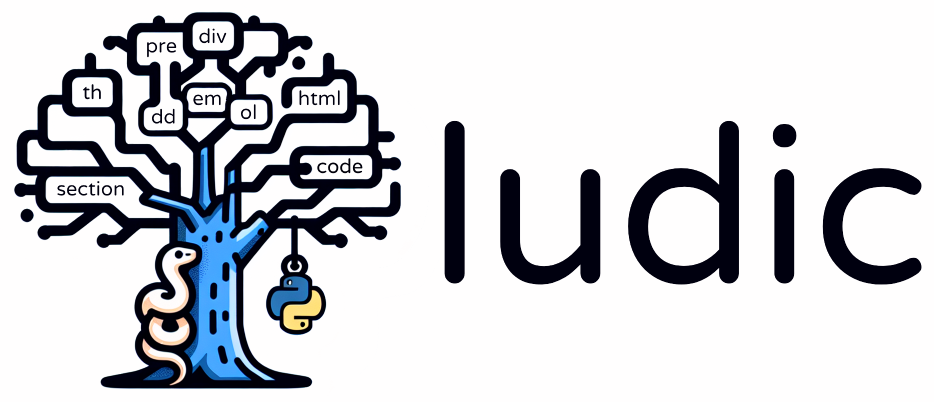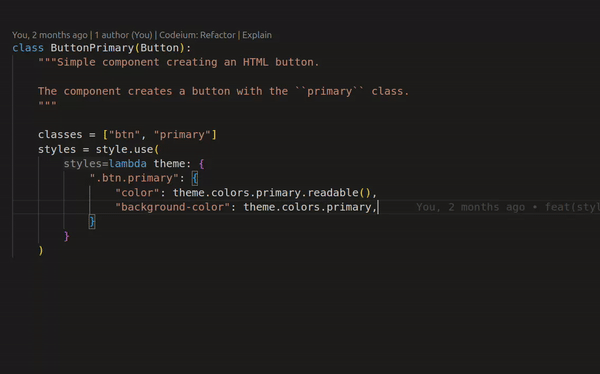Ecosyste.ms: Awesome
An open API service indexing awesome lists of open source software.
https://github.com/getludic/ludic
🌳 Web Development in Pure Python with Type-Guided Components.
https://github.com/getludic/ludic
async html-css-js htmx python template-engine
Last synced: 16 days ago
JSON representation
🌳 Web Development in Pure Python with Type-Guided Components.
- Host: GitHub
- URL: https://github.com/getludic/ludic
- Owner: getludic
- License: mit
- Created: 2024-03-08T06:31:45.000Z (4 months ago)
- Default Branch: main
- Last Pushed: 2024-06-25T15:34:55.000Z (16 days ago)
- Last Synced: 2024-06-25T18:11:05.738Z (16 days ago)
- Topics: async, html-css-js, htmx, python, template-engine
- Language: Python
- Homepage: https://getludic.dev
- Size: 949 KB
- Stars: 674
- Watchers: 6
- Forks: 11
- Open Issues: 18
-
Metadata Files:
- Readme: README.md
- Contributing: CONTRIBUTING.md
Lists
- my-stars - getludic/ludic - 🌳 Web Development in Pure Python with Type-Guided Components. (Python)
- my-awesome-stars - getludic/ludic - 🌳 Web Development in Pure Python with Type-Guided Components. (Python)
README

[](https://github.com/getludic/ludic/actions) [](https://codecov.io/gh/getludic/ludic) [](https://www.python.org/downloads/release/python-312/) [](http://mypy-lang.org/) [](https://discord.gg/4Y5fSQUS)
**Documentation**: https://getludic.dev/docs/
---
*"I've just composed my first `PageLayout` component and I have no words!"*
– Igor Davydenko
---
Ludic is a lightweight framework for building HTML pages with a component approach similar to [React](https://react.dev/). It is built to be used together with [htmx.org](https://htmx.org/) so that developers don't need to write almost any JavaScript to create dynamic web services. Its potential can be leveraged together with its web framework which is a wrapper around the powerful [Starlette](https://www.starlette.io/) framework. It is built with the latest Python 3.12 features heavily incorporating typing.
> [!IMPORTANT]
> The framework is in a very early development/experimental stage. There are a lot of half-functioning features at the moment. Contributions are welcome to help out with the progress!
## Features
- Seamless **</> htmx** integration for rapid web development in **pure Python**
- **Type-Guided components** utilizing Python's typing system
- Uses the power of **Starlette** and **Async** for high-performance web development
- Build HTML with the ease and power of Python **f-strings**
- Add CSS styling to your components with **Themes**
- Create simple, responsive layouts adopted from the **Every Layout Book**
## Comparison
Here is a table comparing Ludic to other similar tools:
| Feature | Ludic | FastUI | Reflex |
|-----------------------------|-------------|-------------|-------------|
| HTML rendering | Server Side | Client Side | Client Side |
| Uses a template engine | No | No | No |
| UI interactivity | [> htmx](https://htmx.org)* | [React](https://react.dev/) | [React](https://react.dev/) |
| Backend framework | [Starlette](https://www.starlette.io)* | [FastAPI](https://fastapi.tiangolo.com) | [FastAPI](https://fastapi.tiangolo.com) |
| Client-Server Communication | [HTML + REST](https://htmx.org/essays/how-did-rest-come-to-mean-the-opposite-of-rest/) | [JSON + REST](https://github.com/pydantic/FastUI?tab=readme-ov-file#the-principle-long-version) | [WebSockets](https://reflex.dev/blog/2024-03-21-reflex-architecture/) |
(*) HTMX as well as Starlette are optional dependencies for Ludic, it does not enforce any frontend or backend frameworks. At it's core, Ludic only generates HTML and allows registering CSS.
## Quick Demo

## Motivation
This framework allows HTML generation in Python while utilizing Python's typing system. Our goal is to enable the creation of dynamic web applications with reusable components, all while offering a greater level of type safety than raw HTML.
**Key Ideas:**
- **Type-Guided HTML**: Catch potential HTML structural errors at development time thanks to type hints. The framework enforces stricter rules than standard HTML, promoting well-structured and maintainable code.
- **Composable Components**: Define reusable, dynamic HTML components in pure Python. This aligns with modern web development practices, emphasizing modularity.
### Type-Guided HTML
Here is an example of how Python's type system can be leveraged to enforce HTML structure:
```python
br("Hello, World!") # type error (
can't have children)
br() # ok
html(body(...)) # type error (first child must be a )
html(head(...), body(...)) # ok
div("Test", href="test") # type error (unknown attribute)
a("Test", href="...") # ok
```
### Composable Components
Instead of using only basic HTML elements, it is possible to create modular components with the support of Python's type system. Let's take a look at an example:
```python
Table(
TableHead("Id", "Name"),
TableRow("1", "John"),
TableRow("2", "Jane"),
TableRow("3", "Bob"),
)
```
This structure can be type-checked thanks to Python's rich type system. Additionally, this `Table` component could have **dynamic properties** like sorting or filtering.
## Requirements
Python 3.12+
## Installation
```
pip install "ludic[full]"
```
Similar to Starlette, you'll also want to install an [ASGI](https://asgi.readthedocs.io/en/latest/) server:
```
pip install uvicorn
```
You can also use a basic cookiecutter template to get quickly started:
```
cookiecutter gh:getludic/template
```
## Full Example
**components.py**:
```python
from typing import override
from ludic import Attrs, Component
from ludic.html import a
class LinkAttrs(Attrs):
to: str
class Link(Component[str, LinkAttrs]):
classes = ["link"]
@override
def render(self) -> a:
return a(
*self.children,
href=self.attrs["to"],
style={"color": self.theme.colors.primary},
)
```
Now you can use it like this:
```python
link = Link("Hello, World!", to="/home")
```
**web.py**:
```python
from ludic.web import LudicApp
from ludic.html import b, p
from .components import Link
app = LudicApp()
@app.get("/")
async def homepage() -> p:
return p(f"Hello {b("Stranger")}! Click {Link("here", to="https://example.com")}!")
```
To run the application:
```python
uvicorn web:app
```
### More Examples
For more complex usage incorporating all capabilities of the framework, please visit the examples on [the web](https://getludic.dev/examples) or go to the folder with examples [on GitHub](https://github.com/getludic/ludic/tree/master/examples/).
## Contributing
Any contributions to the framework are warmly welcome! Your help will make it a better resource for the community. If you're ready to contribute, read the [contribution guide](https://github.com/getludic/ludic/tree/master/CONTRIBUTING.md).
* [GitHub Issues](https://github.com/getludic/ludic/issues) - If you encounter a bug, please report it here.
* [GitHub Discussions](https://github.com/getludic/ludic/discussions) - To request a new feature, this is the best place to initiate the discussion.
* [Discord](https://discord.gg/4Y5fSQUS) - Join our Discord server for support, sharing ideas, and receiving assistance.